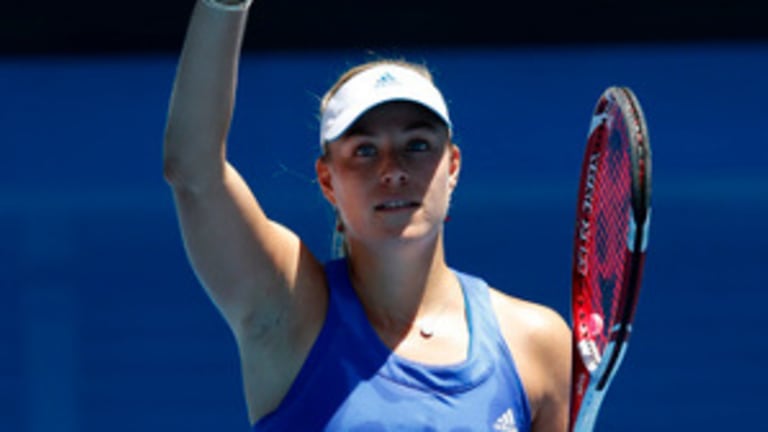If you tuned into the Australian Open shortly after noon, Melbourne time, you could be forgiven for thinking that the tournament was getting off to a wild and unpredictable start.
There was Evgenia Manyukova, Ekaterina Makarova’s coach, screaming at her protégé, who had just dodged a pair of break points that would have given Venus Williams a commanding, 6-2, 4-2 lead in the opening match of the tournament on Margaret Court Arena.
Makarova held, but she allowed Williams to break back in the next game, which begat great weeping and gnashing of teeth in the player-guest box. Meanwhile, ESPN commentators coolly debated whether calling out, “Toss hit high and go up and get it!”—David Witt’s audible plea to Williams, emanating from the opposite player-guest box—could be construed as coaching.
Did Williams hear Witt, or was it merely an anguished, insuppressible, and inappropriate outcry from someone with a rooting interest? Tennis is touched by the bizarre. The only individuals jammed into a huge arena who are supposed to be heard these days are the combatants, who shriek and scream and grunt like barnyard creatures enveloped (ideally) in sublime, worshipful silence.
Meanwhile, elsewhere around the pressure cooker known as Melbourne Park, Andrey Golubev became the first casualty of this edition of a gentleman’s war.
Facing the burly, muscular No. 8 seed Stanislas Wawrinka, Golubev pulled a muscle somewhere in his calf or lower leg and ran up the white flag, giving Wawrinka a 6-4, 4-1 pass to the second round. It seemed a fitting if long-deferred gift for Wawrinka, who had given the fans such a fantastic show in last year’s spectacular, 12-10 in the fifth loss to top-seeded Novak Djokovic.
Incidentally, a few days ago Wawrinka was named Switzerland’s “Sports Personality of the Year” for 2013, and somewhere Roger Federer must have been thinking, “How soon they forget.”
While Golubev was getting his leg wrapped, Angelique Kerber was losing her mind. After her opponent Jarmila Gajdosova rolled an ankle and paused to have it examined and wrapped, Kerber seemed to utterly lose interest in the proceedings and lost the second set without winning a single game.
Gajdosova, a Slovak who emigrated to Australia and now lives in Melbourne, seemed on the cusp of winning her first singles match at the Australian Open in eight frustrating attempts. Kerber looked like she was figuring out which afternoon bus to catch in order to take part in the daily tourist ritual of watching the penguins of nearby Phillip Island waddle ashore.
On yet another battlefield, Belinda Bencic—the second-youngest player in the women’s draw at 16—was suffering from abuse inflicted on her by the oldest woman in the mix, 43-year-old Kimiko Date-Krumm. After losing the first set, Date-Krumm had a break in the second and was rolling toward a win.
With the mercury in the thermometer rising almost visibly, habitués of the press room began to Google “Wet Bulb Globe Temperature,” to re-acquaint themselves with the tournament’s “extreme heat policy.” Who knew it could get so complicated when, really, you could just get on the PA system and declare, “Wow, it’s awfully hot out there, let’s pack it in for a little while.”
The temperature in Rod Laver Sauna rose 13 degrees between the 11 AM start of play and 1:40 PM, to 84-fahrenheit. And there was worse to come.
